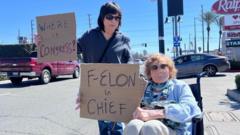Philadelphia’s largest public sector union, AFSCME District Council 33, has reached a tentative deal with the city’s mayor, ending a strike that significantly impacted local services.
Philadelphia Union Reaches Tentative Agreement, Ending Trash Collection Strike

Philadelphia Union Reaches Tentative Agreement, Ending Trash Collection Strike
The eight-day strike led to trash piling up on city streets, but a new agreement offers hope for municipal workers.
The American Federation of State, County and Municipal Employees District Council 33 announced early Wednesday morning that a tentative labor agreement had been reached with Mayor Cherelle Parker, concluding an eight-day strike that paralyzed trash collection and disrupted various city services. The announcement, made via the union's Facebook page around 4:30 a.m. Eastern, marked a pivotal moment for the approximately 9,000 municipal employees, which includes 1,000 sanitation workers.
Mayor Parker expressed her satisfaction in a social media statement, highlighting the importance of the agreement not only for the workers but also for the taxpayers and businesses of Philadelphia. “I have good news tonight for the hard-working men and women of AFSCME District Council 33,” she said, signaling a new chapter in labor relations within the city.
The strike commenced on July 1, leading city officials to adjust services, including the closure of several public libraries and the delay of repairs for critical infrastructure like water mains and roadways. Among the most immediate effects was the visible accumulation of garbage, which caused hygiene concerns and unpleasant odors across Philadelphia. In response, the city employed private contractors and nonunion municipal employees to address the refuse issue, although this approach faced criticism over its effectiveness.
Under the negotiated terms, the tentative contract proposes a 14 percent wage increase for union members over four years, aligning with Mayor Parker's tenure in office. However, the deal is still pending ratification by union members, who had been negotiating after their previous one-year contract extension expired at the start of the month. With inflation affecting wage growth, union officials argued that the city’s initial wage proposals were inadequate.
This strike marked a significant moment in labor relations for the union, being its first extended work stoppage in nearly four decades, underscoring the increasingly vocal demands of public sector employees in these challenging economic times.
Mayor Parker expressed her satisfaction in a social media statement, highlighting the importance of the agreement not only for the workers but also for the taxpayers and businesses of Philadelphia. “I have good news tonight for the hard-working men and women of AFSCME District Council 33,” she said, signaling a new chapter in labor relations within the city.
The strike commenced on July 1, leading city officials to adjust services, including the closure of several public libraries and the delay of repairs for critical infrastructure like water mains and roadways. Among the most immediate effects was the visible accumulation of garbage, which caused hygiene concerns and unpleasant odors across Philadelphia. In response, the city employed private contractors and nonunion municipal employees to address the refuse issue, although this approach faced criticism over its effectiveness.
Under the negotiated terms, the tentative contract proposes a 14 percent wage increase for union members over four years, aligning with Mayor Parker's tenure in office. However, the deal is still pending ratification by union members, who had been negotiating after their previous one-year contract extension expired at the start of the month. With inflation affecting wage growth, union officials argued that the city’s initial wage proposals were inadequate.
This strike marked a significant moment in labor relations for the union, being its first extended work stoppage in nearly four decades, underscoring the increasingly vocal demands of public sector employees in these challenging economic times.





















